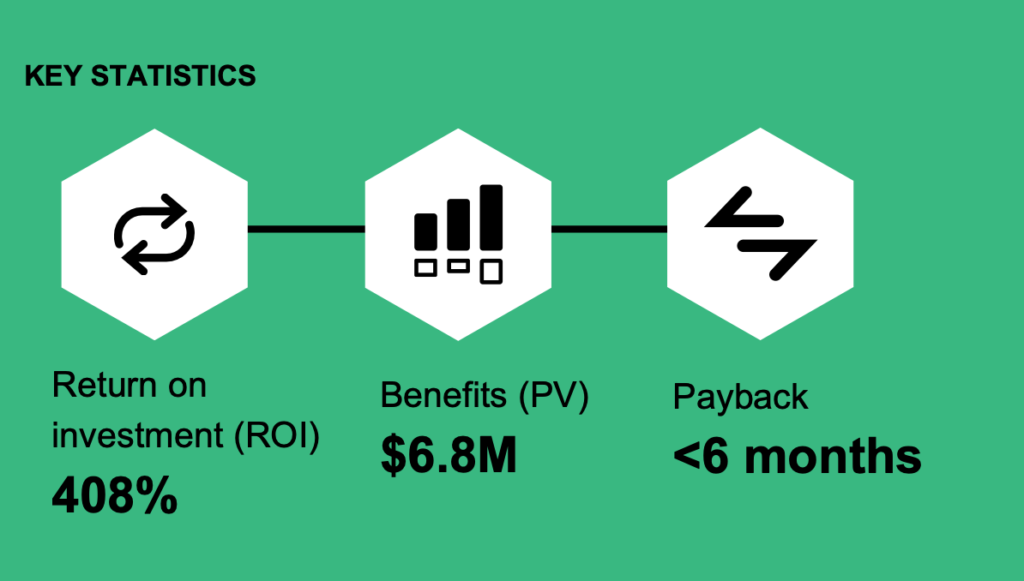
As I embark on my new journey with Denodo and data virtualization, I am now frequently asked, “What is data virtualization?” Unless I am talking to a data engineer or a data architect (this would help explain it, if you are one!), I often just tell people that data virtualization is an agile, cost-effective approach to data management that helps non-technical users access data and gain business insights much more quickly than traditional approaches.
As a technologist, I think data virtualization is extremely elegant and powerful, but as a wise manager once told me, ultimately, we need to answer the key question of “So What?” through the lens of our customers. To me, the best way to answer that is to look at the potential impact and ROI it can generate. Denodo recently worked with Forrester and published a paper on The Total Economic Impact Of Data Virtualization,” which I think provided more than enough material to answer the “So What” question.
Ultimately, we need to be able to answer the key question of “So What?” through the lens of our customers
If you would like to learn about an analytics project that can potentially generate an ROI of 408%, I encourage you to take a close look at that paper. For those who are too busy to read the whole PDF (however you really should!), here are some of the key findings that I think are important for anyone involved in data and analytics today.
The ROI Is Multi-Faceted

Let’s start with Forrester’s definition of data virtualization, which forms the basis of the study:
“Data virtualization enables organizations to effectively integrate and manage their data where it lives without replicating it, allowing both technical and non-technical users to quickly answer key business questions using a data-driven approach”.
From this definition and frame of reference, Forrester worked with Denodo and identified a number of Denodo customers across multiple industries. Forrester then developed a composite organization based on interviews with key decision-makers from these organizations (details of the overall process, assumptions made, and the composite organization can be found in the full report). Potential ROI through the use of data virtualization is then calculated and presented in the paper.
By virtualizing disparate data sources into a single logical data layer, giving business users the tools needed to perform their data discovery and preparation, organizations can expect significant potential benefits compared with those yielded by traditional/ETL data management approaches. The potential ROI over three years is multi-faceted and can come from several different areas, including:
– $1.7M through a decrease in data delivery times over ETL
– $1.5M through reduced legacy integration costs
– $1.7M through improved operational efficiency
– $698K through efficiency gains for data scientists
Beyond this quantifiable potential ROI in several areas, which led to an overall ROI of 408% over three years, Forrester also identified a number of significant qualitative benefits through the use of the Denodo Platform, including:
– Improved overall organizational flexibility and agility
– Customer and employee satisfaction
– Ease of audits and implementing security and governance compliances
One particular customer in the study provided a timely and relevant example of the value of agility offered by data virtualization:
“There is no way that my team, even if we dropped everything, would have been able to react to a situation like the pandemic as fast as we did without Denodo.”
All About Speed and Agility
If there is one thing that analytics and business users care most about (in terms of “So What”), it is how technology can help them reduce time-to-value and get insights faster. The study provided extensive data and insights into why data virtualization is critical in gaining speed and agility. One of the interviewees captured this sentiment perfectly:
“With the Denodo Platform, the real value is that we deliver value to the business faster. If I have to wait a month to get answers to a business question, chances are the question is no longer relevant. The Denodo Platform lets us get answers quickly so we can make better strategic decisions faster.” -VP of data and analytics, real estate
By moving away from slower, more labor-intensive ETL processes, the Denodo Platform can accelerate the process of data discovery, optimize query requests, and build a centralized governance architecture that enables organizations to access data more quickly. This is reflected in the potential ROI identified over three years in this area:
– 65% decrease in delivery time over ETL
– 67% reduction in data preparation efforts
Specifically, the 67% reduction in data preparation efforts was focused on data scientists who can leverage the Denodo Platform to accelerate data discovery and automate data integration efforts across disparate sources. One customer attributed the Denodo Platform for helping one data scientist team to bring down the modelling time from 3 months to 1 week. Another team moved its development cycle to weekly releases as the individual data scientists can now add new data sources within 2 to 3 hours.
One customer attributed Denodo for helping their data scientist team bring down modelling time from 3 months to 1 week
Time to value

In an era of large, complex, multi-year big data or data lake projects that often do not see any tangible returns in the short term, data virtualization is unique in its ability to quickly capture returns and value.
The Forrester study found that organizations can typically expect payback in less than six months. The agile nature of data virtualization means that it typically does not require as many resources and has a shorter implementation timeframe, when compared with data warehousing or large data lake projects. Not only does that limit the risk of a data virtualization implementation, but it should also raise the returns.
One of the key findings was that organizations can expect payback in less than six months.
If you think this ROI is too good to be true and that these studies are often too aggressive with their assumptions (as I sometimes do), here are a few examples of similar ROI and business benefits realized by our customers through data virtualization:
- Prologis accelerated analytics activities by 30% by leveraging the Denodo platform.
- Seacoast Bank improved efficiency and reduced its data warehouse development time by 40%.
- The Phone House Increased Global Efficiency by More than 50% and Reduced Client In-Store Waiting Times by 75%.
Every organization is in its own stage in the data management maturity cycle, and the potential returns from data virtualization will vary. But hopefully, the Forrester study and the examples mentioned above provide enough ammunition to get past the “So What?” question and proceed to the “full report)” question, starting on the path to realizing similar returns by tackling data silos, reducing IT costs, and increasing agility.
- Query RAG – A New Way to Ground LLMs with Facts and create Powerful Data Agents - December 16, 2024
- Welcome to the Era of Denodo Assistant - November 20, 2024
- Unlocking the Power of Generative AI: Integrating Large Language Models and Organizational Knowledge - February 22, 2024
